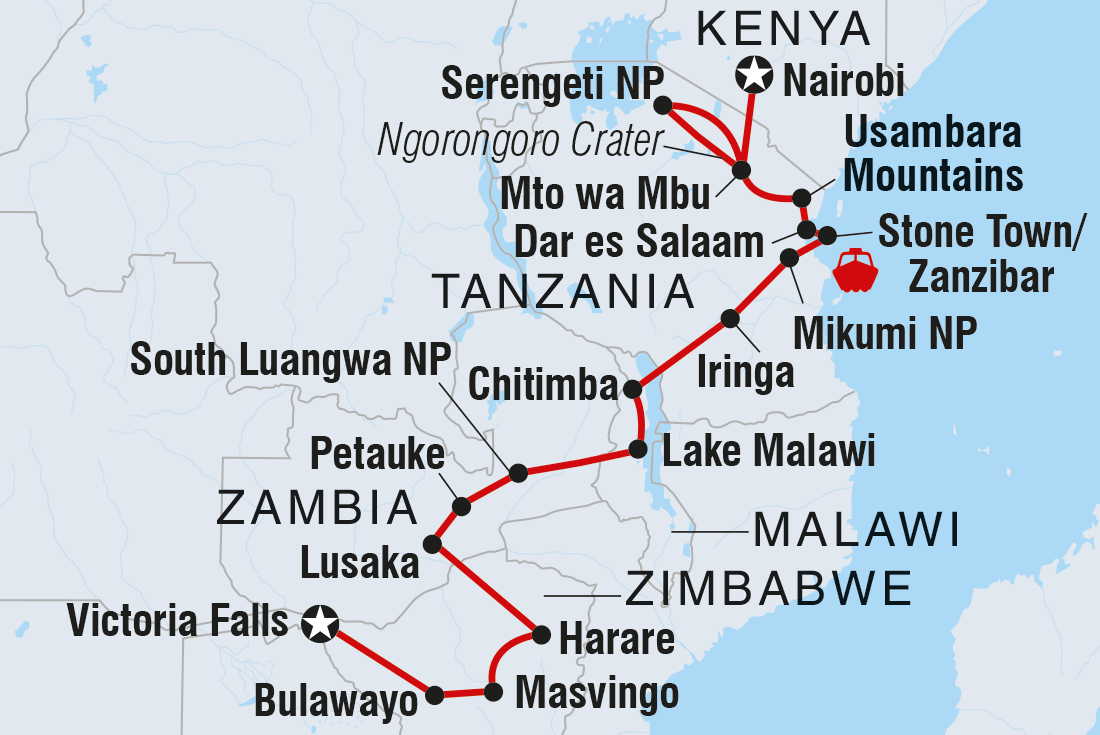
Head on an action-packed adventure direct to East Africa’s biggest and best. Spend 27 unforgettable days spotting the Big Five in the vast plains of the Serengeti and deep in the Ngorongoro Crater, hiking the lush Usambara Mountains in search of the longest horizon, and lolling about Zanzibar’s pristine beaches, fragrant spice plantations and historic Stone Town. You’ll be accompanied by a crew of a local leader, driver and cook, on hand to offer their recommendations and make your overland journey a whole lot easier.
- Embark on an unforgettable safari across the floor of the Ngorongoro Crater in an open-roof vehicle with your small group for a chance to see the endangered black rhinoceros in full view.
- Chill out on the northern beaches of Zanzibar enjoying white sand and sparkling blue sea of the Indian Ocean, perhaps taking up the chance to visit the island’s famed spice plantations.
- Discover the magic of South Luangwa National Park on a morning safari game drive. This park is a highly concentrated arena of noble African beasts and exotic wildflowers.
- Get a chance to explore the largest ruins in sub-Saharan Africa – the World Heritage-listed Great Zimbabwe, thought to be the former palace of an ancient monarch.
- Discover the history and heritage of local communities – including the San People – with guided cultural walks and a knowledgeable local leader to provide insights.
- Track rhinos on foot in Matobo National Park, home to a diverse range of flora and fauna including warthogs, leopards, and klipsingers. Learn about the park's cultural significance and San rock paintings.
- Chill out on the northern beaches of Zanzibar, enjoying the white sand and sparkling blue sea of the Indian Ocean, maybe visiting the island’s famed spice plantations.
- Get a chance to explore the largest ruins in sub-Saharan Africa – the World Heritage-listed Great Zimbabwe, considered the former palace of an ancient monarch.
- Accommodation on this trip is mainly in two-person canvas dome tents with camping mattresses supplied.
- The type and variety of accommodation are determined by conditions on each of our routes. Each route is different - on some, we use a mixture of campsites and wild camps; on others, we also use hotels. In Africa, it's not usually practical to camp when staying in towns and cities, so we use hotel accommodations and eat out in local restaurants.
- There may be the occasional night stop when we stay on the grounds of a hotel or at a campsite, which may also have rooms/cabins available. In this case, there may be a choice of camping or upgrading to a room. Rooms cost approximately USD 40-100 per room per night for a twin room and cannot be pre-booked. Standards of these rooms vary greatly, and we recommend viewing the room before purchasing the night's accommodation. The day-by-day itinerary advises when upgrades may be possible (subject to availability).
- Keep in mind that if we are staying in dormitory accommodation, you may have to share with other passengers or be split into same-sex rooms.
- Campsites do have facilities, but they usually aren't to the same standard you would find in Western countries. For example, the bathroom facilities can be very basic. Toilet paper is rarely provided, and shower facilities can be as simple as a hose pipe spurting out cold water. Wild camps have no facilities at all.
- At times, there may be spare tents in the vehicles. Unfortunately, these cannot be used without the purchase of a single supplement. This is to ensure the tents avoid wear and tear or are clean and ready for the customers arriving on the next section of the trip.